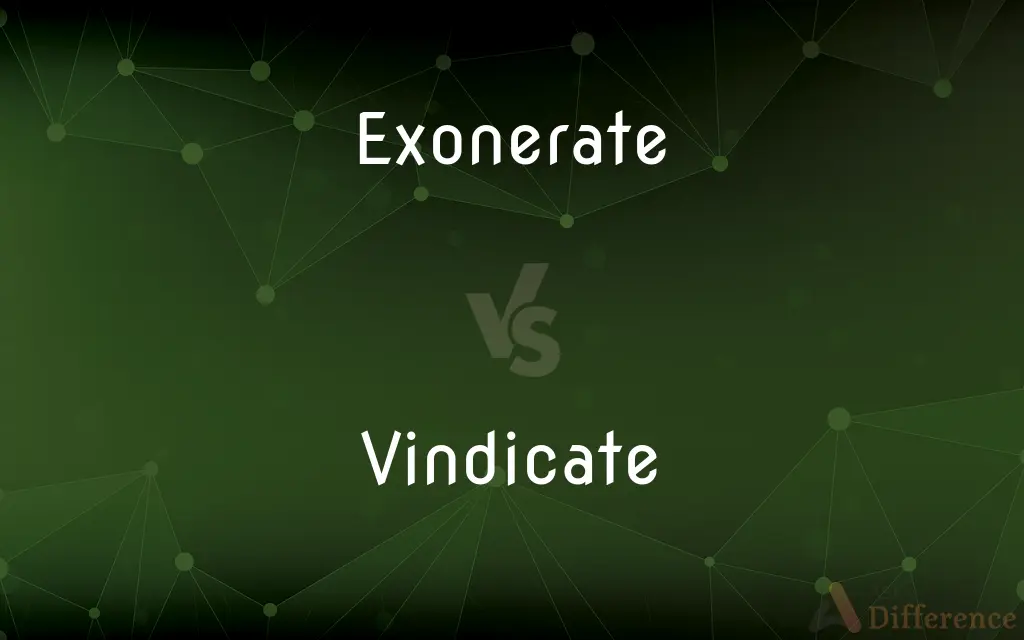Exonerate vs. Vindicate — What's the Difference?
By Maham Liaqat & Fiza Rafique — Updated on May 7, 2024
Exonerate means clearing someone of blame or guilt, usually after an investigation, whereas vindicate refers to proving someone's innocence or correctness after being doubted or accused.

Difference Between Exonerate and Vindicate
Table of Contents
ADVERTISEMENT
Key Differences
Exonerate means to clear someone of criminal charges or wrongdoing. This often happens through legal proceedings or investigations, while vindicate means proving someone's correctness after being accused, doubted, or criticized, showing they were right all along.
Exoneration typically implies formal processes where evidence leads to absolving someone of alleged wrongdoing, while vindication can occur in everyday situations when someone’s reputation is restored after being falsely doubted.
Exonerate is commonly used in legal contexts when charges or accusations are formally removed, whereas vindicate applies to various situations, including moral or professional defense, where someone's integrity is proven.
Exonerating someone often requires a thorough investigation or legal review, which formally establishes their innocence, while vindicating someone may only require presenting convincing evidence or arguments to prove a stance.
Exonerate often implies an official, external process to clear someone’s name, whereas vindicate focuses on the personal or social acknowledgment that one's position or innocence has been confirmed.
ADVERTISEMENT
Comparison Chart
Definition
Clear from blame or guilt
Prove innocence or correctness
Usage
Legal and formal contexts
Everyday or informal situations
Requirements
Requires investigation or legal review
Requires evidence or persuasive argument
Implication
Officially absolves from accusations
Restores credibility or moral high ground
Example Contexts
Criminal trials, official investigations
Personal reputation, work disputes, opinions
Compare with Definitions
Exonerate
Clear from blame or guilt, typically after an investigation.
The new evidence helped exonerate the wrongly accused suspect.
Vindicate
Prove someone right after doubt or criticism.
The scientific study vindicated his earlier hypothesis about climate change.
Exonerate
To release from a charge or responsibility.
The committee's findings exonerated him from negligence charges.
Vindicate
Defend successfully against an accusation.
She was vindicated by the testimony of a reliable witness.
Exonerate
To free someone from a burden or obligation.
Her dedication to the project exonerated her from other assignments.
Vindicate
Demonstrate the validity of a particular stance or viewpoint.
The election results vindicated his campaign strategies.
Exonerate
To formally clear someone's record.
The judge exonerated her of the allegations after reviewing all the facts.
Vindicate
Show someone's actions or beliefs were justified.
The strong performance of the product vindicated the marketing team's approach.
Exonerate
To acquit someone through legal means.
DNA evidence exonerated him years after his wrongful conviction.
Vindicate
Clear someone of suspicion.
The report vindicated her involvement in the financial transactions.
Exonerate
(of an official body) absolve (someone) from blame for a fault or wrongdoing
They should exonerate these men from this crime
An inquiry exonerated those involved
Vindicate
To clear of accusation, blame, suspicion, or doubt with supporting arguments or proof
"Our society permits people to sue for libel so that they may vindicate their reputations" (Irving R. Kaufman).
Exonerate
Release someone from (a duty or obligation)
Pope Clement V exonerated the king from his oath to the barons
Vindicate
To defend, maintain, or insist on the recognition of (one's rights, for example).
Exonerate
To free from blame.
Vindicate
To demonstrate or prove the value or validity of; justify
The results of the experiment vindicated her optimism.
Exonerate
To free from a responsibility, obligation, or task.
Vindicate
(Obsolete) To exact revenge for; avenge.
Exonerate
To relieve (someone or something) of a load; to unburden (a load).
Vindicate
(transitive) To clear of an accusation, suspicion or criticism.
To vindicate someone's honor
Exonerate
Of a body of water: to discharge or empty (itself).
Vindicate
(transitive) To justify by providing evidence.
To vindicate a right, claim or title
Exonerate
(transitive) To free (someone) from an obligation, responsibility or task.
Vindicate
(transitive) To maintain or defend (a cause) against opposition.
To vindicate the rights of labor movement in developing countries
Exonerate
(transitive) To free (someone) from accusation or blame.
Vindicate
(transitive) To provide justification for.
The violent history of the suspect vindicated the use of force by the police.
Exonerate
(archaic) Freed from an obligation; freed from accusation or blame; acquitted, exonerated.
Vindicate
(transitive) To lay claim to; to assert a right to; to claim.
Exonerate
To unload; to disburden; to discharge.
All exonerate themselves into one common duct.
Vindicate
To liberate; to set free; to deliver.
Exonerate
To relieve, in a moral sense, as of a charge, obligation, or load of blame resting on one; to clear of something that lies upon oppresses one, as an accusation or imputation; as, to exonerate one's self from blame, or from the charge of avarice.
Vindicate
To avenge; to punish.
A war to vindicate infidelity
Exonerate
To discharge from duty or obligation, as a bail.
Vindicate
To lay claim to; to assert a right to; to claim.
Is thine alone the seed that strews the plain?The birds of heaven shall vindicate their grain.
Exonerate
Pronounce not guilty of criminal charges;
The suspect was cleared of the murder charges
Vindicate
To maintain or defend with success; to prove to be valid; to assert convincingly; to sustain against assault; as, to vindicate a right, claim, or title.
Vindicate
To support or maintain as true or correct, against denial, censure, or objections; to defend; to justify.
When the respondent denies any proposition, the opponent must directly vindicate . . . that proposition.
Laugh where we must, be candid where we can,But vindicate the ways of God to man.
Vindicate
To maintain, as a law or a cause, by overthrowing enemies.
Vindicate
To liberate; to set free; to deliver.
I am confident he deserves much moreThat vindicates his country from a tyrantThan he that saves a citizen.
Vindicate
To avenge; to punish; as, a war to vindicate or punish infidelity.
God is more powerful to exact subjection and to vindicate rebellion.
Vindicate
Show to be right by providing justification or proof;
Vindicate a claim
Vindicate
Maintain, uphold, or defend;
Vindicate the rights of the citizens
Vindicate
Clear of accusation, blame, suspicion, or doubt with supporting proof;
You must vindicate yourself and fight this libel
Common Curiosities
Does exonerate imply innocence?
Yes, it implies the person has been formally cleared of blame or guilt.
Can you be vindicated but not exonerated?
Yes, one can be vindicated (shown to be right) without being formally exonerated if accusations remain.
Is evidence required for exoneration and vindication?
Yes, evidence is needed for both, but exoneration requires formal investigation, while vindication can involve persuasive arguments.
Are both terms interchangeable?
No, exonerate has a formal, legal connotation, whereas vindicate is broader and more general.
What is a common synonym for exonerate?
Acquit is a common synonym for exonerate.
Can an innocent person be vindicated?
Yes, an innocent person can be vindicated if their actions were doubted.
Is vindicate always used in legal contexts?
No, vindicate is often used in everyday contexts where someone's actions or beliefs are proven correct.
How is exonerate used in daily language?
Mostly in legal or official contexts when someone is cleared of accusations.
Does vindicate relate only to criminal cases?
No, vindicate can be used in non-criminal situations to confirm someone's beliefs, actions, or innocence.
Does exonerate always mean proven innocent?
Yes, exoneration implies that someone was found innocent after being accused.
Is vindication always about legal innocence?
Not always; it also relates to proving someone's correctness or integrity.
Can someone be exonerated posthumously?
Yes, historical reviews can exonerate people after their death.
Does exoneration require a trial?
Not necessarily, but it usually follows a thorough review or investigation.
What is a common synonym for vindicate?
Justify is a common synonym for vindicate.
Is vindication always positive?
Generally, vindication is positive as it restores one's credibility or stance.
Share Your Discovery

Previous Comparison
Airport vs. Jetport
Next Comparison
Arrive vs. DepartAuthor Spotlight
Written by
Maham LiaqatCo-written by
Fiza RafiqueFiza Rafique is a skilled content writer at AskDifference.com, where she meticulously refines and enhances written pieces. Drawing from her vast editorial expertise, Fiza ensures clarity, accuracy, and precision in every article. Passionate about language, she continually seeks to elevate the quality of content for readers worldwide.
















































